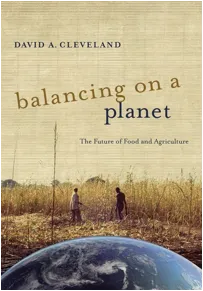Balancing on a Planet argues that while the current Anthropocene epoch presents unique challenges to our food system, including climate change, that threaten our survival, most solutions continue to follow the Neolithic strategy that has been dominant since the beginning of agriculture some 13,000 years ago.

This is a supply-side strategy of increasing food production in response to the demands of a growing population and growing per capita consumption, especially of animal and highly processed foods. While successful in terms of total food supply, this approach has also undermined the biophysical basis of agriculture, and the social and biological purpose of food—the result is high levels of inequality, malnutrition, hunger, and disease.
Abstract
This book is an interdisciplinary primer on critical thinking and effective action for the future of our global agrifood system, based on an understanding of the system’s biological and sociocultural roots. Key components of the book are a thorough analysis of the assumptions underlying different perspectives on problems related to food and agriculture around the world and a discussion of alternative solutions. David Cleveland argues that combining selected aspects of small-scale traditional agriculture with modern scientific agriculture can help balance our biological need for food with its environmental impact—and continue to fulfill cultural, social, and psychological needs related to food.
Balancing on a Planet is based on Cleveland’s research and engaging teaching about food and agriculture for more than three decades. It is a tool to help students, faculty, researchers, and interested readers understand debates about the current crisis and alternatives for the future.
Citation
Cleveland, D.A. (2014) Balancing on a Planet: The Future of Food and Agriculture. Berkeley: University of California Press
You can see further details (and Chapter 1) at UC Press or read the Introduction.




Comments (0)